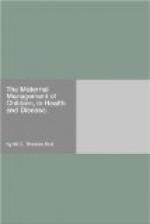When a month or six weeks has elapsed, the child, if healthy, may sleep alone in a cradle or cot, care being taken that it has a sufficiency of clothing, that the room in which it is placed is sufficiently warm, viz. 60 degrees, and the position of the cot itself is not such as to be exposed to currents of cold air. It is essentially necessary to attend to these points, since the faculty of producing heat, and consequently the power of maintaining the temperature, is less during sleep than at any other time, and therefore exposure to cold is especially injurious. It is but too frequently the case that inflammation of some internal organ will occur under such circumstances, without the true source of the disease ever being suspected. Here, however, a frequent error must be guarded against,— that of covering up the infant in its cot with too much clothing throwing over its face the muslin handkerchief—and, last of all, drawing the drapery of the bed closely together. The object is to keep the infant sufficiently warm with pure air; it therefore ought to have free access to its mouth, and the atmosphere of the whole room should be kept sufficiently warm to allow the child to breathe it freely: in winter, therefore, there must always be a fire in the nursery.
The child up to two years old, at least, should sleep upon a feather bed, for the reasons referred to above. The pillow, however, after the sixth month, should be made of horsehair; for at this time teething commences, and it is highly important that the head should be kept cool.
During childhood.—Up to the third or fourth year the child should be permitted to sleep for an hour or so before its dinner. After this time it may gradually be discontinued; but it must be recollected, that during the whole period of childhood more sleep is required than in adult age. The child, therefore, should be put to rest every evening between seven and eight; and if it be in health it will sleep soundly until the following morning. No definite rule, however, can be laid down in reference to the number of hours of sleep to be allowed; for one will require more or less than another.[FN#16] Regularity as to the time of going to rest is the chief point to attend to; permit nothing to interfere with it, and then only let the child sleep without disturbance, until it awakes of its own accord on the following morning, and it will have had sufficient rest.
[FN#16] The amount of sleep necessary to preserve health varies according to the state of the body, and the habits of the individual. As already observed, infants pass much the greater portion of their time in sleep. Children sleep twelve or fourteen hours. The schoolboy generally ten. In youth, a third part of the twenty-four hours is spent in sleep. Whilst, in advanced age, many do not spend more than four, five, or six hours in sleep.




